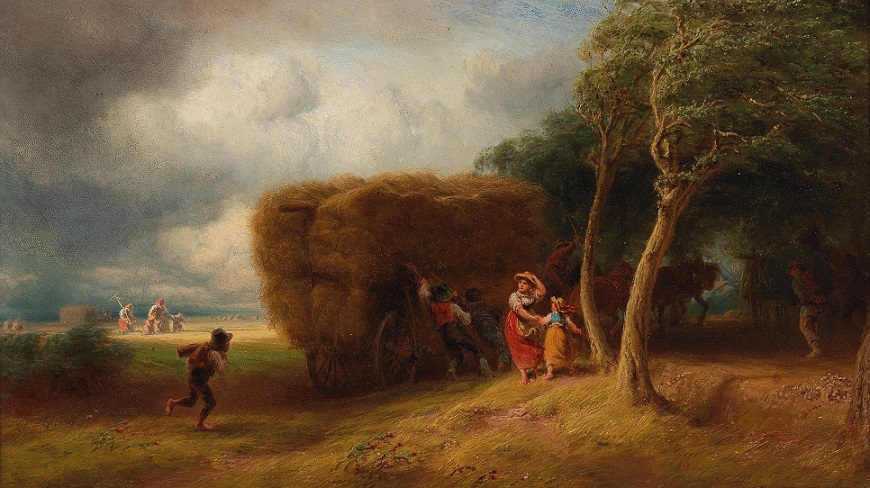.
Haiku
Across western skies,
a long, dark array of clouds:
the storm approaches.
.
.
Parnassus
O, God, he saw the awesome summit rising up ahead,
surprising in its beauty, fearsome in its dire dread.
It rose up higher than surrounding forms—that rounded mount—
above the town, there at its foot, so brown, but radiant.
O, how he longed to climb Parnassus, up its nasty slopes,
much harder, arduous, than he had ever once supposed.
Though picturesque and stunning, it was likewise dangerous:
those jagged, rugged crags, like devil love or angel lust.
Orpheus and the Muses shared its airy atmosphere,
but just as well its limestone and the bauxite mining there.
Though one may come to meet with Pegasus on its grand heights,
thigh-goring boars and howling wolves are just as likely sights.
.
.
Bruce Dale Wise is a poet currently residing in Texas.















Bauxite?! I never took you as a lover of aluminum, but I will take you on your word.
as per Acwiles Berude:
Bauxite, the primary raw material in aluminum production, is rich in the elements of the periodic table. Aluminum is lightweight, durable, ductile, corrosion-resistant, and reusable. Unlike plastic, it’s not toxic. It’s used in mobile phones and tablet PCs. Imagine how much modern industry, like construction, automotive, aviation, energy, food, etc., depends on it.
Aluminum, a silvery white metal, is the 13th element in the periodic table, the most widespread metal on Earth (8%+), and 3rd most common chemical element on the planet, after oxygen and silicon. Side note: rubies and sapphires are corundum, i. e., aluminum oxide (Al2O3).
I suspect Mr. Anderson thinks poets should embrace their worlds, as so many have over the eons, for example, Homer, from which L12 of this dodeca of last month comes. I like the idea of thinking of Mount Parnassus, both from a NewMillennial perspective and a Classical point of view.
As with nearly all of the poetry of Acwiles Berude, as well as the poetry of hundreds of others in that school associated with the writer Bruce Dale Wise, it travels under the radar. So it is never surprising to find little critical analysis of their works, and even less appreciation. This generation has little interest in what he, or they, are trying to do. Be that as it may, it is still interesting for some of us to look at what they are trying to do.
Taking any poem at random, say, “Parnassus”, gives us a partial view of what that author is up to. First off, the poem is a dodeca in iambic heptameter, a structure and a line, one finds the poet regularizing in his poetry of the last decade. He uses both, as Ezra Pound (1885-1972) put it, “to break the pentameter”, or at least its hold, as Wise himself , who has written countless sonnets and poems with iambic pentameter, seems to want to do. What he, and other members of his school, are fond of is creating new linguistic structures, in this case, the dodeca, a twelve lined poem of iambic heptameter, subsumed in English under the banner of the ballad.
In the first stanza, the opening line, though reminiscent of Gerard Manley Hopkins (1844-1889) in its alliteration, length and vista, does not use sprung rhythm; in fact, the poet shows his allegiance to what T. S. Eliot (1888-1965) called “good prose”. The second couplet, again, though reminiscent of Emily Dickinson (1830-1886) in its use of dashes, slant rhyme, internal rhyme and tempo, shows that same allegiance. It’s as though he is touching the edges of those 19th century poets, but bringing them into the NewMillenium in a prosaic form.
In the second stanza, we see that continued allegiance, but understated, as in the manner of Ernest Hemingway (1899-1961), where the topic is poetry itself. The surprising adjective “nasty” takes one immediately into Wise’s Slant; poetry is harsh, “hard…arduous…dangerous”—not a common theme in either PostModernist or NewMillennial verse; in fact, with free verse the common stream of the moem, the opposite is believed. This is indeed ironic for a poet striving after the virtues of prose. After the gutteral, palatal, voiced-stop alliteration, he concludes the stanza with a simile of lateral-dental oxymoronic imagery.
The last stanza begins with the echoic sound “O”, but here is placed within the Ancient preHomeric poet’s name accompanied by the inspirational goddesses of literature, art, and science. The focus on Ancient Greece continues in line three; but the second line brings poetic flight, the “airy atmosphere” back to the Ground, with the mention of limestone and bauxite mining, and finally the Greek mountain itself to its fauna, “thigh-goring boars and howling wolves”, both noted by Homer (c. 750 BC) in his epics.
More could be said about the poetic elements, structure and theme, which unite fluidly in this lyric, and which show both his link to Ancient Classical literature and to NewMillennial visions, but the main point here is noting his articulation of another new platform on which to perform.